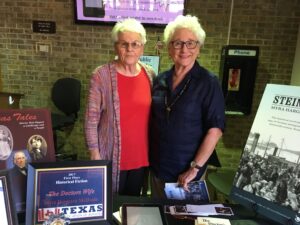In the late 1870s word spread across England of the fabulous money—returns of thirty-three to fifty percent on investments—to be made in American cattle ranching. Two British aristocrats, Sir Edward Marjoribanks the Baron of Tweedmouth and his brother-in-law John Campbell Hamilton Gordon, Earl of Aberdeen, established the “Rocking Chair Ranche” in 1883. Courting dreams of a vast English-style estate, the two “cattlemen” bought 235 sections in the Texas Panhandle counties of Collingsworth and Wheeler and began stocking their land with 14,745 head of cattle and 359 ponies. They laid out the town of Aberdeen with a ranch house, corrals, and a store as the nucleus of their envisioned cattle empire.
The inhabitants of the Texas Panhandle in the 1880s, in true frontier spirit, did not take to the high-minded notions of the English. West Texans considered themselves equals whether they owned extensive cattle ranches or only a few steers and a dugout. The English ranchers, unfortunately, held to their Old World attitudes regarding master and servants. In response to their references to cowboys as “cow servants” their establishment became known as “Nobility Ranch.”
J. John Drew, an Englishman who partnered in the original scheme to sell cattle ranch land to British investors became general manager of the Rocking Chair. He got along well with the “cow servants” and knew cattle, but he wasn’t scrupulously honest.
Baron Tweedmouth’s younger brother, Archibald John Marjoribanks became assistant manager and bookkeeper at the ranch. Uninterested in the life of a rancher and known among the cowboys as “Archie” or “Old Marshie”, Archibald spent his days drinking and gambling in Mobeetie saloons and hunting with his purebred hounds while drawing an annual salary of $1,500. The “Honourable Archie” never associated with or rode with the cowboys. Soon, even men who prided themselves on always being fair in their cattle dealings began openly rustling cattle from “Nobility Ranch,” apparently with Drew’s knowledge.
Everyone in the Eastern Panhandle except Archibald knew of the thefts, and that rustlers and disgruntled cowboys were openly stealing from the ranch. Drew, who maintained the loyalty of the ranch employees, kept for himself 100 cows for every one stolen and reportedly shipped more cattle than he recorded for the ranch. For a time the ranch prospered, but the thievery began to show in the financial reports. Without prior notice Lord Aberdeen, Baron Tweedmouth, and other investors showed up at ranch headquarters demanding an inventory. Drew directed the cowboys to drive cattle around a nearby hill and back several times to make the count increase by several hundred and satisfy the “Lords of the Prairie” that the ranch operated an increasingly large herd.
Additionally, a feud developed in 1890 between settlers and squatters of Southern Collingsworth County, who wanted Pearl City to be the county seat and the Rocking Chair faction that had laid out Wellington for that purpose.
The Rocking Chair cowboys also caused the Great Panhandle Indian Scare in January 1891 when they killed a steer for supper, accidentally incinerated the carcass of the animal and in the process let out some loud whoops and celebratory gunfire. Although Indians had been run out of the Panhandle for at least ten years, settlers living in the remote region continued to be nervous. A woman living near the commotion rushed with her two children to report the blood-curdling war whoops. The news of an impending slaughter went out over the telegraph at the train station. Citizens barricaded themselves, waiting in terror for the attack. A hardware store in Clarendon sold out of guns and ammunition. Finally, the Texas Rangers mustered to defend the terrified citizenry only to discover that the noise came from Rocking Chair Ranch Cowboys having a good time. It took three days to calm the frightened community, and the episode became known as The Great Panhandle Indian Scare.
By 1891 the Rocking Chair herd was so reduced that the entire range had to be searched to produce two carloads of calves for market. The owners tried bringing charges against Drew, but community feelings against the Englishmen made it impossible to impanel a jury. The ranch was sold in 1895, and all that remains are the names of Wellington and Rocking Chair Hills in the northern part of Collingsworth County.

Another wonderful story, Myra. Hurry up and compile that book! I want one – several actually 🙂
Thanks for your encouragement. a book is in my plan. finishing a novel first.
Sent from my iPhone
I love these stories, they remind me of the cowboy/Indian/oil baron/cattle baron genre of movies I saw when I was a kid. And now I live near or in the areas that were depicted. Thank you Myra for keeping the history fresh.
Thanks, Trudy. Great to see your comments while we cruise across Germany. it’s good to be connected. just enjoyed your blog about your gardening.
Sent from my iPhone
Enjoy! We are going to do something similar in May! Hugs!
Another great story. I love “cow servants.” 🙂
I smile every time I think of “cow servants.”